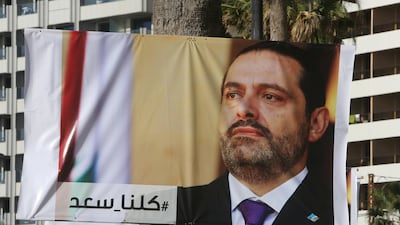For decades, Lebanon has been the site where rivalries between covetous big powers have unfolded. Iran, Syria and Israel have all taken turns ravaging the beautiful country, leaving it paralysed and dysfunctional for long stretches of time. Even in supposedly stable times, it has never been able to escape the shadow of Iran, or free itself from the grip of Tehran's malignant proxy militia, Hizbollah, which runs a parallel government. It is this toxic influence of Iran, which is responsible for Lebanon's ongoing political crisis.
Saad Hariri, the Lebanese premier, announced his resignation at the beginning of the month because of a credible threat of assassination at Hizbollah's hands. Given that Mr Hariri's late father, Rafik, was murdered by the same forces in 2005, it is hardly surprising that he chose to resign from the safety of Saudi Arabia. To remain in Lebanon would have been to take a gamble on his life. No one who values Mr Hariri's life can fault him for acting with great caution. Which naturally rules out Hizbollah, whose leader, Hassan Nasrallah, went on television on Friday to accuse Riyadh of fomenting chaos in Lebanon by extending hospitality to Mr Hariri. "Saudi officials have declared war on Lebanon", declared the chief of Hizbollah, an organisation which has been stifling and stamping on the Lebanese people for three decades on behalf of its paymasters in Iran.
_______________
Read more
US warns against proxy conflicts in Lebanon
Hariri has audience with King Salman after resigning as Lebanese PM
The manifestations of Iran's troubling actions
_______________
Tehran, obsessed with creating a sectarian "Shiite Crescent" in the Middle East, has energetically sought to spin Mr Hariri's decision to quit as part of a Saudi plan to draw the region into a military confrontation. But as the US military made clear on Friday, it is Tehran that is provoking conflict. According to the Pentagon, the ballistic missile fired at Saudi Arabia from Yemen on November 4 bore "Iranian markings". Could there be a more ambiguous declaration of war? On Friday, the US secretary of state, Rex Tillerson, warned Iran against "using Lebanon as a venue for proxy conflicts", saying "there is no legitimate place or role in Lebanon for any foreign forces, militias or armed elements other than the legitimate security forces of the Lebanese state".
In an ideal world, Mr Hariri would return home and clarify his position. But a world in which Hizbollah and Iran are able to operate with impunity is far from ideal. Saudi Arabia, which is rapidly modernising domestically, cannot realistically be expected to tolerate repeated assaults on its national security. Nor can Mr Hariri be expected to expose himself to mortal danger merely to appease the malign forces that have held Lebanon captive for decades. The patience of Iran's perennial victims must not be taken for granted. Tehran's rhetoric and provocations must come to a halt before events spin out of control.
Follow The National's Opinion section on Twitter

